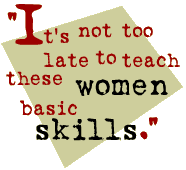WORK & MONEY

LOSING
AT WIN
Published May 27, 1996

Previous columns
by
Harry Goldstein
Once a year I team-teach an introductory computer class at Casa Rita in the Bronx, a half-way house for single mothers recovering from drug and alcohol problems. Part of the Women In Need (WIN) program includes exploring employment options. For six of Casa Rita's residential clients that means enrolling in the "Introduction to WordPerfect 5.1" class.
It's occurred to me more than once over the course of a class that it doesn't really matter how much the clients learn or if they go on to further their job skill training. The reason the clients and the volunteers take part in the exercise is to feel good about ourselves. The clients look forward to receiving their certificates of completion, and once having attained that goal, look for other goals to pursue.
The satisfaction the volunteers derive, however, is short-lived. Introducing computers to people who have never had the opportunity to engage with them before should make me feel like I've empowered them somehow. But, ultimately, it's a hollow victory. There isn't a follow-up course to build on the foundation we constuct over eight weeks. The clients never practice, nor are they encouraged to by their career counselors.
And, while for these women it is an accomplishment to show up to a class every Tuesday for eight weeks, not much beyond their attendence is measured. We give them a final exam, but half of it is multiple choice and much of the practical portion of the exam consists of Ed and me leaning over the keyboard, hinting at what keys to hit. It's not too late to train these women or teach them basic skills -- but relying on volunteers to teach these skills for eight classes isn't going to get the job done or get these women into jobs. Not to mention that we're teaching them a practically obsolete DOS application in a world of Windows programs, that we never show them what a mouse looks like or a modem for that matter.

Basically, we conspire with WIN to give our students an illusion of power that will be shattered if and when they enter the workforce. That this illusion serves a certain purpose is not an issue; the real issue is whether volunteers should be doing the government's job. What is the comparative cost to society if these women are properly trained for the job market and go on to be productive, tax-paying citizens -- or if they end up on the dole? There's no question that the public education system failed these women the first time around, but do they (and the rest of us) have to pay the price for the rest of their lives? The only way to break the cycle of poverty is to have faith in people's ability to provide for themselves once they are equipped with the necessary tools.

Those of us who work -- and especially those of us in information-driven occupations -- tend to take our computer skills for granted. Like many people, I acquired a number of job skills almost by default, all except for typing, which remains the only high school class that did me any good in the "real world." As a white male, it was pretty easy to get office work where I could be exposed to tasks that required me to learn on the job. I never went a business college, but my Casa Rita students -- low-income, African-American women -- would benefit greatly from going to one. They would not only learn valuable skills there, but they would have a credential to present at the door in lieu of a long resume detailing the kind of job experience many of us take for granted.
There's a reason we have affirmative action in this country and I am reminded of why every Tuesday night: if any of these women decide to pursue careers as word processors or office administrators, what are their chances of getting the opportunity to work -- not to mention the opportunity to fail and then learn from their mistakes -- even IF they graduate from a vocational school? Not very good with affirmative action in place; no chance at all without it. Then there's the question of who is going to pay for them to go to school if they really want to. I say it's worth it for you and me to foot the bill now and reap the benefits of eventually having more working people to share the burden with us.
One of the most tell-tale signs of
the raw deal my students got is the fact that their children sit down at
their computers and feel right at home, playing games and typing stories
because they're learning on computers at school. It's time their mothers
are given the same opportunity -- before their children and other taxpayers
end up having to support them.
Harry Goldstein is a writer and editor living in Manhattan. His work has appeared in Utne Reader, American Book Review, Promethean, AltX, word.com, and other periodicals.
© 1996 Harry Goldstein, All Rights Reserved
